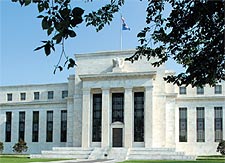|
The US Federal Reserve (Fed) has been quite aggressive in recent times in cutting interest rates to stimulate growth in the economy. However, the season of such drastic fiscal action may be coming to an end, if the meetings of its latest meeting are anything to go by. In the minutes, released on Wednesday, the Fed sent the strongest signals yet that they planned to hold interest rates steady barring ''a significant weakening'' in the economy. Reasons cited were damage from a housing slump, credit crunch and galloping energy prices.  The comments were made at a meeting in late April. But their public release capped a week of bleak economic news that underlined the bankers' concerns. The comments were made at a meeting in late April. But their public release capped a week of bleak economic news that underlined the bankers' concerns.
Crude oil jumped to a record of $135 a barrel on Thursday, two days after a government report showed that businesses were struggling to cope with higher wholesale costs. (See: Oil rises over $135 a barrel)
Adding to the gloom was a report that Moody's, the ratings agency, may have accidentally assigned high-quality ratings to debt products that later lost much of their value. (See: Computer error at Moody's assigns high ratings to risky debt)
The hawkish tone cast a cloud over Wall Street, where major stock indexes entered a free fall just after the report's release. Stocks tumbled, sending the Standard & Poor's 500 Index to its biggest two-day drop since March, as the Federal Reserve signaled it is done cutting interest rates and record oil prices threatened to reduce profits at consumer companies. Citigroup Inc., Bank of America Corp. and JPMorgan Chase & Co. sent financial shares to their lowest since 15 April. Target Corp. led retailers to their worst decline in a month and an index of airlines slid to an all-time low as crude climbed above $133 a barrel. (See: Soaring oil prices to draw blood from airlines: CAPA report)
The S&P 500 lost 22.69 points, or 1.6 per cent, to 1,390.71. The Dow Jones Industrial Average slid 227.49, or 1.8 per cent, to 12,601.19. The NASDAQ Composite Index fell 43.99, or 1.8 per cent, to 2,448.27. Four stocks retreated for every one that rose on the New York Stock Exchange. The minutes also said that most Fed officials were on the fence last month over whether to cut rates by a quarter point, saying that the decision was a ''close call.'' It was the Fed's seventh cut since September, including a cut of 0.75 percentage point between meetings in January. (See: Fed cuts short-term interest rate by 75 basis points to 2.25 per cent and Fed cuts key lending rate to 3.25 per cent)
"Most members viewed the decision to reduce interest rates at this meeting as a close call," the documents showed. "Although downside risks to growth remained, members were also concerned about the upside risks to the inflation outlook, given the continued increases in oil and commodity prices." The Fed hopes that its series of powerful rate cuts ordered since last September and the government's $168 billion stimulus package of tax rebates for people and tax breaks for businesses will help energize growth somewhat in the second half of this year. Fed officials viewed economic activity "as likely to be particularly weak in the first half of 2008; some rebound was anticipated in the second half of this year," the documents stated. The Fed also forecast higher unemployment and inflation for this year. It said it expects inflation to remain "elevated" and unemployment to increase "significantly," and did not expect to return to normal levels anytime soon. Central bankers projected that prices would rise in 2008 at an annual rate of 3.1 to 3.4 percent, far faster than the year before, and a full percentage point above their earlier estimate in January. At the same time, they predicted that the nation's rate of overall economic growth would significantly slow, to rate of 0.3 to 1.2 per cent. This is much lower compared to its earlier forecast of 1.3 per cent to 2 per cent three months ago. Wages also stagnated in April, and several officials said they believed that the weak labour market would keep salaries low. Average salary growth has failed to keep pace with inflation. The economy has expanded at a sluggish 0.6 per cent annual rate in both the last three months of 2007 and the first quarter of this year. At the same time, however, record high oil prices have pushed up energy and food prices, raising the consumer price index by 3.9 per cent in the 12 months to April.
|